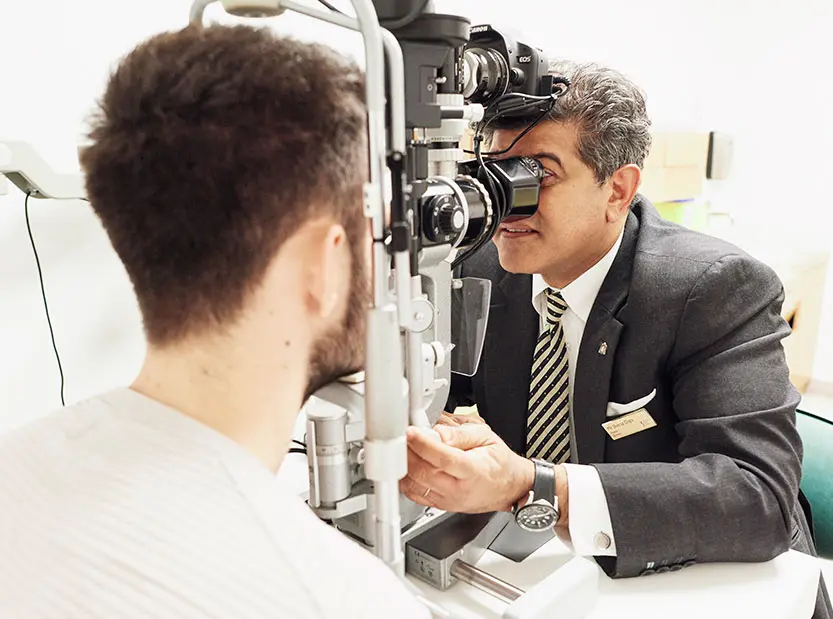Laser Eye Surgery Problems: What You Need to Know
Laser eye surgery, such as LASIK and LASEK, has helped millions of people around the world reduce or eliminate their dependence on glasses and contact lenses. It’s generally safe, quick, and highly effective. Laser eye surgery problems are rare but like any surgical procedure, it is not without risks.

Side effects are best divided into what are temporary and to be expected as part of healing
Common Side Effects (Usually Temporary)
Carefully selected patients treated at a centre of good repute may get some mild and temporary side effects.
1. Dry Eyes
This is the most frequently reported issue after LASIK and PRK and to be expected. It lasts for a few weeks to a few months. The cause of this is a temporary reduction in nerve sensation and in turn tear production. This corrects itself as nerve endings grow back over a period of 6 to 12 weeks. Patients are encouraged to use artificial tears and in some cases specific medicated eye drops.
Good centres will perform specific tests for underlying dry eye and treat this if present before proceeding with laser eye surgery.
2. Glare, Halos, and Starbursts
A faint halo initially after surgery is sometimes reported and decreases over the next few days to weeks. The cause can be slight swelling which scatters light. In other cases those with large pupils might notice a bit more halo. The good news is with modern lasers and Aspheric profile treatments, halos are rare and do resolve with time.

3. Blurry or Fluctuating Vision
Some patients report intermittent blurriness of vision often when they are working at monitors or on their phones. This may be from a reduced blink rate and dry eye. This improves over time. Patients are encouraged to follow the 20 -20 -20 rule – every 20 mins stop working and look out of the window for 20 seconds and then close the eyes for 20 seconds before going back to work! This allows the eyes to take a break and reduces fluctuation of vision.
Less Common Problems
4. Under-correction or Overcorrection or regression
With accurate diagnostics and preoperative evaluation at a good centre along with new laser technology, over and under-correction is rare. Should this occur, then enhancement (touch up) surgery can correct the problem and usually performed once the eye power is stable – typically at 3 months. Untreated dry eye sometimes causes regression which is why it is so important to follow the prescribed postoperative regimen and use lubricants frequently following laser eye surgery.

5. Difficulty with Night Vision
Some patients struggle to see well at night and the cause of this may well be induction of aberrations – often from lasers that are not technically advanced. Modern lasers with Aspheric treatment profiles reduces spherical aberration which is the principle cause of night vision issues. Other causes include decentred treatments and a residual prescription.
Rare But Serious Complications
6. Infection or Inflammation
Infection is a risk with any procedure. It is also a risk of wearing contact lenses (1:100 in a lifetime). The risk of infection at a good centre is less than 1:10,000. Again a good evaluation at the consultation stage will pick up risk factors which can be treated in advance of surgery. Infection requires prompt attention and treatment.

7. Ectasia
This is a very rare condition where the cornea becomes progressively thin and may bulge leading to distorted vision. The risk for this condition can be picked up by a thorough preoperative evaluation with specific diagnostic tests which can pick up any corneal abnormalities. Biomechanical testing of the cornea is also very useful in ensuring the cornea is not weak prior to surgery. The condition of ectasia can be treated by strengthening of the cornea using a procedure called Collagen Crosslinking with Riboflavin (CXL).
How can I minimise risks of laser eye surgery?
- Choose a reputable surgeon and clinic. Experience and technology matter.
- Attend all pre-operative and follow-up appointments. These help detect and manage issues early.
- Follow all post-operative care instructions. They are critical to a smooth recovery.

Is Laser Eye Surgery Right for You?
Laser eye surgery has transformed the lives of millions and has been liberating for the absolute vast majority. Like all procedures there are potential problems which can be reduced or eliminated by entrusting your care with a surgeon and organisation of good repute and long experience. Ideally as this is a procedure that involves the cornea, search for a consultant who is a fellowship-trained in cornea and refractive surgery.